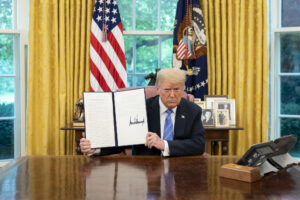Let us bet on it. The day of 1 February 2024, when the 27 heads of state and government of the European Union allocated 50 billion in aid to Ukraine, could well go down in history as the day when the political Europe was born.
Not only because the 27 confirmed their determination to stand united against Vladimir Putin’s imperial ambitions, but also because at the same time the Trumpist members of the House of Representatives continued to block American aid to Ukraine. On 1 February 2024, while America failed to demonstrate the solidarity of the democracies, the Europeans took up the gauntlet and asserted their determination to defend freedom on their own, without their long-standing protector and guardian.
Yes, this is the date that history could assign to the end of the era of America as the world’s policeman, and to the culmination of the long process of the United States shifting its focus to its competition with China, while at the same time the European Union asserted itself as a player on the international stage, except…
Except that three conditions still need to be met.
The first is for the 27 leaders of the Union to tell the 450 million Europeans that we are at war, not on the eve of sending troops to Ukraine and even less of marching on Moscow, but at war against an autocrat who would like to restore an Empire by sowing desolation in the very heart of our continent. We are not in the 1940s, and we do not need to talk about sweat, blood and tears, but it must be said that we are at war because this resistance to Vladimir Putin will require real sacrifices. It has already cost us the rise in the cost of our energy supplies, the consequent undermining of the German economy and the loss of our industrial investment in Russia. It will now require us to allocate an increasing proportion of our budgetary expenditure to defence, to realise that we have an adversary to defeat, to create pan-European arms industries without delay – in short, to get out of the complacency that has led us to believe since 1945, despite Yugoslavia, that we would never again see war in Europe.
The second condition is that the European political forces that Russia is working so hard to strengthen are called upon to choose. The extreme right-wing parties in Germany, France, Austria and the Netherlands, the Italian Lega, the Swedish Democrats and many others now have to explain their collusion with the Kremlin. These parties can no longer be content with Jordan Bardella’s pretence of an admission that “We may have been naive”. Voters must be able to know who they are casting their vote for by voting for self-proclaimed “patriots” who are all too ready to sell out Ukraine, the Baltic States and ultimately our sovereignty to the Kremlin.
The third condition is to organise, from the centre-right to the ecologists, via the socialists and the centre-left, a united front of democratic forces determined not to let the master of the Kremlin win. It’s in no way a matter of erasing the differences of approach between political families but of remembering that, in the war, Churchill, de Gaulle and Roosevelt did not embody political parties but the will to win.
Under these conditions, we will win, because after two decades of Putinism, Russia, the largest country in the world, this country brimming with gas and oil, cannot match the GDP even of France or Germany. It is only at the economic level of Spain or the Netherlands, only at the level of one of the middle powers of the EU. There is nothing invincible about this criminal and tired regime, this political power of thieves and incompetents. Even without the United States, even on its own, the Union can win over him, but it will not succeed unless it remembers that victory is demanding.



